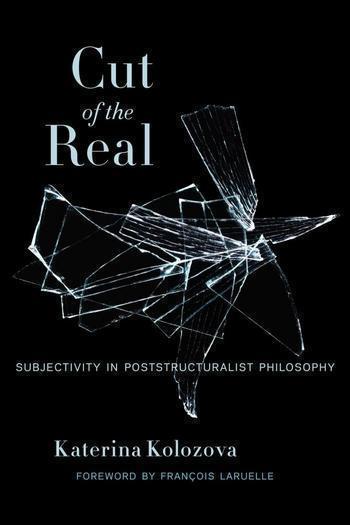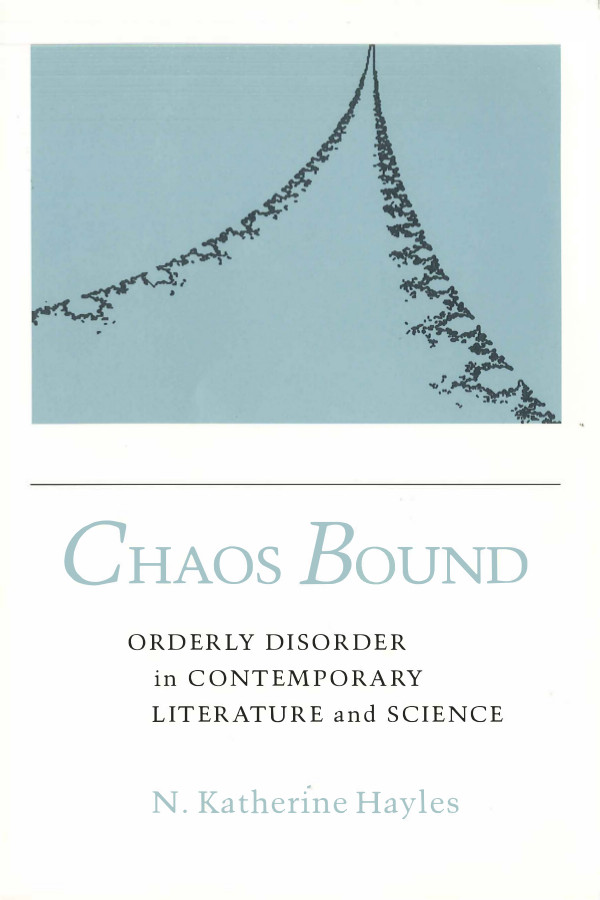Katerina Kolozova: Cut of the Real: Subjectivity in Poststructuralist Philosophy (2014)
Filed under book | Tags: · deconstruction, feminism, gender, identity, immanence, language, philosophy, poststructuralism, queer theory, race, subject, subjectivity, transcendence

“Following François Laruelle’s nonstandard philosophy and the work of Judith Butler, Drucilla Cornell, Luce Irigaray, and Rosi Braidotti, Katerina Kolozova reclaims the relevance of categories traditionally rendered “unthinkable” by postmodern feminist philosophies, such as “the real,” “the one,” “the limit,” and “finality,” thus critically repositioning poststructuralist feminist philosophy and gender/queer studies.
Poststructuralist (feminist) theory sees the subject as a purely linguistic category, as always already multiple, as always already nonfixed and fluctuating, as limitless discursivity, and as constitutively detached from the instance of the real. This reconceptualization is based on the exclusion of and dichotomous opposition to notions of the real, the one (unity and continuity), and the stable. The non-philosophical reading of postructuralist philosophy engenders new forms of universalisms for global debate and action, expressed in a language the world can understand. It also liberates theory from ideological paralysis, recasting the real as an immediately experienced human condition determined by gender, race, and social and economic circumstance.”
Foreword by François Laruelle
Publisher Columbia University Press, 2014
Insurrections series
ISBN 0231166109, 9780231166102
xvi+184 pages
Review: Maxwell Kennel (Parrhesia, 2015).
Comment (0)N. Katherine Hayles: Chaos Bound: Orderly Disorder in Contemporary Literature and Science (1990)
Filed under book | Tags: · chaos theory, entropy, history of literature, information theory, literary theory, literature, nonlinearity, physics, postmodernism, poststructuralism, science, thermodynamics, writing

“At the same time that the study of nonlinear dynamics came into its own in the sciences, the focus of literary studies shifted toward local, fragmentary modes of analysis in which texts were no longer regarded as deterministic or predictable. N. Katherine Hayles here investigates parallels between contemporary literature and critical theory and the emerging interdisciplinary field known as the science of chaos. She finds in both scientific and literary discourse new interpretations of chaos, which is seen no longer as disorder but as a locus of maximum information and complexity. The new paradigm of chaos includes elements that, Hayles shows, were evident in literary theory and literature before they became prominent in the sciences. She asserts that such similarities between the natural and human sciences are the result not of direct influence but of roots in a common cultural matrix.
Hayles traces the evolution of the concept of chaos and evaluates the work of such theorists as Prigogine, Feigenbaum, and Mandelbrot, for whom chaos entails an unpredictably open universe in which knowledge is limited to local sites and scientific models can never exhaust the possibilities of the actual. But this view does not imply that scientists have given up the search for global explanations of natural phenomena, for chaos is conceived of as containing its own form of order. Hayles envisions chaos as a double-edged sword: it can be viewed either as a recognition that disorder plays a more important role in natural processes than had hitherto been recognized or as an extension of order into areas that had hitherto resisted formalization. She examines structures and themes of disorder in The Education of Henry Adams, Doris Lessing’s Golden Notebook, and works by Stanislaw Lem. Hayles concludes by showing how the writings of poststructuralist theorists incorporate central features of chaos theory-such as an interest in relating local sites to global structures; a conception of order and disorder as interpenetrating rather than opposed; an awareness that in complex systems small causes can lead to massive effects; and an understanding that complex systems can be both deterministic and unpredictable.
Chaos Bound contributes to and enliven current debates among chaos theorists, cultural critics and cultural historians, critical theorists, literary critics interested in nineteenth- and twentieth-century literature, researchers in nonlinear dynamics, and others concerned with the relation between science and culture.” (from the back cover)
Publisher Cornell University Press, 1990
ISBN 0801497019, 9780801497018
309 pages
via author
Review: Tom LeClair (SubStance, 1991)
See also Hayles, The Cosmic Web: Scientific Field Models and Literary Strategies in the Twentieth Century, 1984.
Comment (0)François Cusset: French Theory: How Foucault, Derrida, Deleuze, & Co. Transformed the Intellectual Life of the United States (2003–) [FR, EN]
Filed under book | Tags: · deconstruction, feminism, france, history, history of philosophy, literary theory, marxism, philosophy, politics, postmodern, poststructuralism, structuralism, theory, united states

“During the last three decades of the twentieth century, a disparate group of radical French thinkers achieved an improbable level of influence and fame in the United States. Compared by at least one journalist to the British rock ‘n’ roll invasion, the arrival of works by Michel Foucault, Jacques Derrida, Jean-François Lyotard, Jean Baudrillard, Gilles Deleuze, and Félix Guattari on American shores in the late 1970s and 1980s caused a sensation.
Outside the academy, “French theory” had a profound impact on the era’s emerging identity politics while also becoming, in the 1980s, the target of right-wing propagandists. At the same time in academic departments across the country, their poststructuralist form of radical suspicion transformed disciplines from literature to anthropology to architecture. By the 1990s, French theory was woven deeply into America’s cultural and intellectual fabric.
French Theory is the first comprehensive account of the American fortunes of these unlikely philosophical celebrities. François Cusset looks at why America proved to be such fertile ground for French theory, how such demanding writings could become so widely influential, and the peculiarly American readings of these works. Reveling in the gossipy history, Cusset also provides a lively exploration of the many provocative critical practices inspired by French theory. Ultimately, he dares to shine a bright light on the exultation of these thinkers to assess the relevance of critical theory to social and political activism today—showing, finally, how French theory has become inextricably bound with American life.”
Publisher La Découverte, Paris, 2003
ISBN 2707146730
373 pages
English edition
Translated by Jeff Fort, With Josephine Berganza and Marlon Jones
Publisher University of Minnesota Press, 2008
ISBN 0816647321, 9780816647323
388 pages
Reviews: Jennifer Ferng (Leonardo), Juliet J. Fall (Foucault Studies), Ethan Kleinberg (NPDR), Bridie Lonie (Junctures, FR).
French Theory: Foucault, Derrida, Deleuze & Cie et les mutations de la vie intellectuelle aux États-Unis. (French)
French Theory: How Foucault, Derrida, Deleuze, & Co. Transformed the Intellectual Life of the United States. (English)

